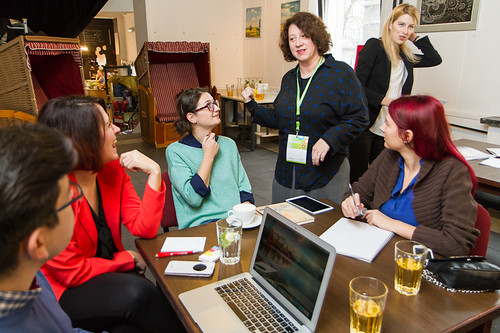 I get contacted regularly by university students doing a Master’s degree research project that relates to virtual volunteering and, unfortunately, their research subject is almost always the same: the motivations of people to be online volunteers.
I get contacted regularly by university students doing a Master’s degree research project that relates to virtual volunteering and, unfortunately, their research subject is almost always the same: the motivations of people to be online volunteers.
I’m blunt in my response to them: please don’t. This subject is not one that nonprofits or NGOs are asking for. In fact, it has become a joke among managers of volunteers: oh, look, *another* paper about people’s motivations for volunteering… ARGH!
This article by Susan Ellis and Rob Jackson well explains why the idea of yet another survey project about volunteer motivations is not something most nonprofits or NGOs are interested in. Read in particular the part called “A Preoccupation with the Motivations to Volunteer.”
What would NGOs and nonprofits love to know about virtual volunteering? What would be great, even ground-breaking research regarding virtual volunteering? Here are some digital volunteering research topics in dire need of exploration (and that really need to be undertaken by people that are NOT me):
- factors for success in keeping online volunteers productive and engaged long-term at an organization or within a program
- how online volunteers and/or those that involve them define a successful virtual volunteering experience, and exploring if these are in conflict
- if online microvolunteering really does lead to longer-term virtual volunteering/higher responsibility roles at an organization, and/or if it leads to greater numbers of donors
- expectations of people that sign up for online volunteer assignments before they begin versus the reality of the assignments/relationships/benefits
- are the advantages that are promoted regarding virtual volunteering – that it allows for people to be more involved in an organization they already volunteer with onsite, that it allows for the participation of people as volunteers who might not be able to otherwise, that it can be a form of accommodation for people who have disabilities, that it frees up staff to undertake other activities, etc. – realized most of the time? some of the time? what factors are necessary for those benefits to be realized – or preventing them from becoming realities?
- what causes people to quit volunteering online, and are the reasons similar or different than what causes people to quit traditional, onsite volunteering?
- comparative case studies of online volunteer engagement and support for such at a variety of organizations, looking at factors for successful management, budgets for such, number of people working directly with the online volunteers, etc.
- comparative case studies of screening of people that want to volunteer online at a variety of organizations, looking for factors that may lead to greater completion of tasks and longer-term commitments by online volunteers or may lead to greater drop out rates of accepted volunteers that receive assignments.
- comparative case studies of organizations involving online volunteers, regarding what percentage of volunteers are using a laptop or desktop computer for completing assignments, versus those using smart phones and tablets. And is there a difference in the kinds of assignments being done on laptops and desktops versus smart phones and tablets? Is there a difference in the kinds of volunteers using laptops and desktops versus smart phones and tablets?
- comparative case studies of online mentoring programs that involve online volunteers as mentors, regarding why some last more than two years and why others end early, or immediately after the pilot phase
- comparative case of online mentoring programs that involve online volunteers as mentors, regarding their meeting of stated education, self-esteem, career exploration or other goals
- comparative case of online mentoring programsthat involve online volunteers as mentors, on mentors or on participants five years after participation
- how much does involving online volunteers cost for the host organization – a comparison of at least 20 organizations in the USA (or any one country, for that matter)
- are there management needs that are different for online volunteers representing different groups (by age, by geographic region, by profession, by education level, etc.) to complete assignments and to be inspired to continue supporting an organization over months rather than just days or weeks
- what differences are there in the success of involving online volunteers in non-English-speaking countries in Europe or elsewhere in comparison with North America?
- what differences are there in the success of involving online volunteers in developing or transitional countries where Internet access is available to large portions of the population (India, Nigeria, South Africa, Pakistan, Poland, etc.) in comparison with North America?
- how does satisfaction with volunteering among online volunteers compare to satisfaction with volunteering undertaking onsite administrative roles that do NOT involve interactions with clients (onsite volunteers that help with mailings, help with inventory, help prepare a room for an event later, file papers, provide IT support to staff, etc.). Do these two groups of volunteers feel similar isolation? Do any feelings of isolation or support relate to being online or is it because of lack of regular staff interaction, online or face-to-face? Or lack of access to seeing the impact of direct service with clients?
Tackle any of those research projects and I will promote your research everywhere online I possibly can. I may even dance in the streets.
Four cautions for researchers of virtual volunteering:
- During your literature review, you will need to look at research articles and case studies that never use the word volunteers. or the term virtual volunteering. For instance, people that contribute their time and talent, online, to nonprofit open source projects may never be called volunteers. Those that contribute their time and knowledge to Wikipedia online are usually called Wikipedians rather than volunteers. Yet, research literature on these subjects is vital for informing any researcher wanting to do an academic study regarding virtual volunteering.
- If you interview people, you will also not be able to use the phrase virtual volunteering without fully explaining it and ensuring people understand your definition; otherwise, you will find people saying they don’t volunteer online or do not involve volunteers online when, in fact, they do – they just didn’t understand the meaning so they said no.
- Read this list of myths regarding virtual volunteering before you begin. If you start your research from an assumption that online volunteers are more isolated and less supported than onsite volunteers, for instance, or that virtual volunteering is great for people that don’t have time for onsite volunteering, or that people that volunteer online don’t do so onsite, face-to-face, then you are starting from a false premise that is not supported by any research to date. And if you want your research to test one of these myths, by all means, go for it!
- You will be hard pressed to find anyone volunteering exclusively online; the vast majority of people that volunteer online ALSO volunteer onsite (and if you have research that says otherwise, let’s hear about it!). That’s why it’s impossible to measure things like if the health benefits associated with volunteering are exclusive for onsite volunteering.
All of the research I know related to virtual volunteering, by the way, is listed here on the virtual volunteering wiki. I try to update this list at least once a year. Note that, as of a few years ago, most of it is NOT by me! Hurrah!
Other blogs I’ve written on the subject of research and volunteering, including virtual volunteering, that should be helpful to anyone researching any aspect of virtual volunteering:
- How many virtual volunteering projects are there?
- Finding out how many orgs are involving online volunteers
- Research on USA volunteerism excludes virtual volunteering
- What I learned from researching virtual volunteering in Europe
- Update re: research on virtual volunteering in Europe
- Volunteerism research should include virtual volunteering!
- Volunteerism-related research wish list for 2012
- Yes, research microvolunteering, however…
- Needed: Online Volunteering Research (my blog on this subject from 2010)
 Why don’t I do at least some of the aforementioned research? Three reasons: One: I’m burnt out regarding virtual volunteering research. I poured so many years and effort into researching and writing The LAST Virtual Volunteering Guidebook, as well as managing various virtual volunteering initiatives since the 1990s, and I need a break. Two: I would really like to read research by OTHER PEOPLE. I think fresh eyes and fresh minds could bring to light things all of my many years researching this subject has made me blind to. I’m so ready to be enlightened on this subject by other people! Three: I don’t have the resources. I would need funding and I would want my research associated with a university, preferably in association with my obtaining a PhD.
Why don’t I do at least some of the aforementioned research? Three reasons: One: I’m burnt out regarding virtual volunteering research. I poured so many years and effort into researching and writing The LAST Virtual Volunteering Guidebook, as well as managing various virtual volunteering initiatives since the 1990s, and I need a break. Two: I would really like to read research by OTHER PEOPLE. I think fresh eyes and fresh minds could bring to light things all of my many years researching this subject has made me blind to. I’m so ready to be enlightened on this subject by other people! Three: I don’t have the resources. I would need funding and I would want my research associated with a university, preferably in association with my obtaining a PhD.
So, those are the research needs regarding virtual volunteering, at least as far as I can see. What are YOUR ideas?



